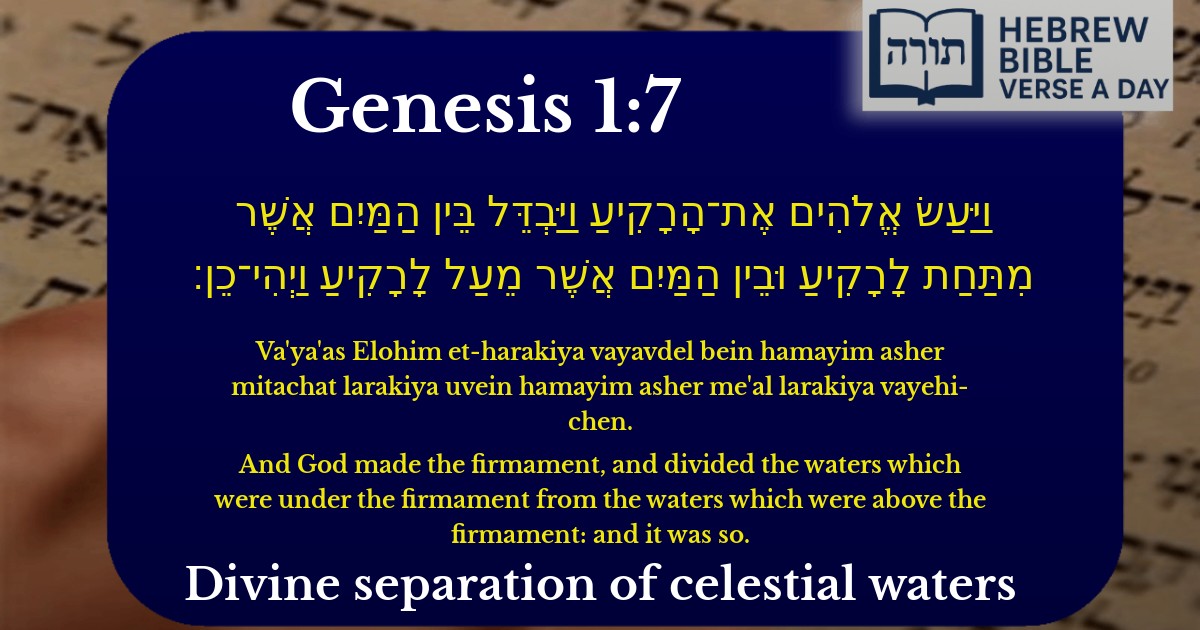Join Our Newsletter To Be Informed When New Videos Are Posted
Join the thousands of fellow Studends who rely on our videos to learn how to read the bible in Hebrew for free!
Hebrew Text
וַיַּעַשׂ אֱלֹהִים אֶת־הָרָקִיעַ וַיַּבְדֵּל בֵּין הַמַּיִם אֲשֶׁר מִתַּחַת לָרָקִיעַ וּבֵין הַמַּיִם אֲשֶׁר מֵעַל לָרָקִיעַ וַיְהִי־כֵן׃
English Translation
And God made the firmament, and divided the waters which were under the firmament from the waters which were above the firmament: and it was so.
Transliteration
Va'ya'as Elohim et-harakiya vayavdel bein hamayim asher mitachat larakiya uvein hamayim asher me'al larakiya vayehi-chen.
Hebrew Leining Text
וַיַּ֣עַשׂ אֱלֹהִים֮ אֶת־הָרָקִ֒יעַ֒ וַיַּבְדֵּ֗ל בֵּ֤ין הַמַּ֙יִם֙ אֲשֶׁר֙ מִתַּ֣חַת לָרָקִ֔יעַ וּבֵ֣ין הַמַּ֔יִם אֲשֶׁ֖ר מֵעַ֣ל לָרָקִ֑יעַ וַֽיְהִי־כֵֽן׃
וַיַּ֣עַשׂ אֱלֹהִים֮ אֶת־הָרָקִ֒יעַ֒ וַיַּבְדֵּ֗ל בֵּ֤ין הַמַּ֙יִם֙ אֲשֶׁר֙ מִתַּ֣חַת לָרָקִ֔יעַ וּבֵ֣ין הַמַּ֔יִם אֲשֶׁ֖ר מֵעַ֣ל לָרָקִ֑יעַ וַֽיְהִי־כֵֽן׃
🎵 Listen to leining
Parasha Commentary
📚 Talmud Citations
This verse is quoted in the Talmud.
📖 Chagigah 15a
The verse is referenced in a discussion about the creation of the firmament and the division of the waters, illustrating the divine act of separation during creation.
📖 Berakhot 59a
Mentioned in the context of praising God for the natural phenomena, specifically the separation of waters as part of the wonders of creation.


The Creation of the Rakiah (Firmament)
The verse (Bereishit 1:7) describes the second day of creation, where Hashem forms the rakiah (firmament) to separate the upper and lower waters. Rashi explains that the term rakiah refers to a stretched-out expanse, like a canopy spread over the earth. This separation is foundational to the structure of the universe as we know it.
The Nature of the Upper and Lower Waters
According to the Midrash (Bereishit Rabbah 4:2), the "waters above the firmament" are the heavenly reservoirs from which rain descends, while the "waters below" are the seas and oceans. Ramban (Nachmanides) elaborates that the upper waters are in a spiritual or elevated state, whereas the lower waters are physical and tangible.
The Significance of Separation
The act of separation (havdalah) is a recurring theme in Creation. The Talmud (Chagigah 15a) teaches that the division between upper and lower waters reflects the distinction between spiritual and physical realms. This mirrors the later separation of light and darkness, and the division between holy and mundane.
Why No "Ki Tov" on the Second Day?
Notably, the phrase "וַיַּרְא אֱלֹהִים כִּי־טוֹב" ("And God saw that it was good") is absent on the second day. The Midrash (Bereishit Rabbah 4:6) explains that since division implies potential conflict (as seen later with the Flood), the work was incomplete until the third day, when dry land emerged and harmony was achieved.